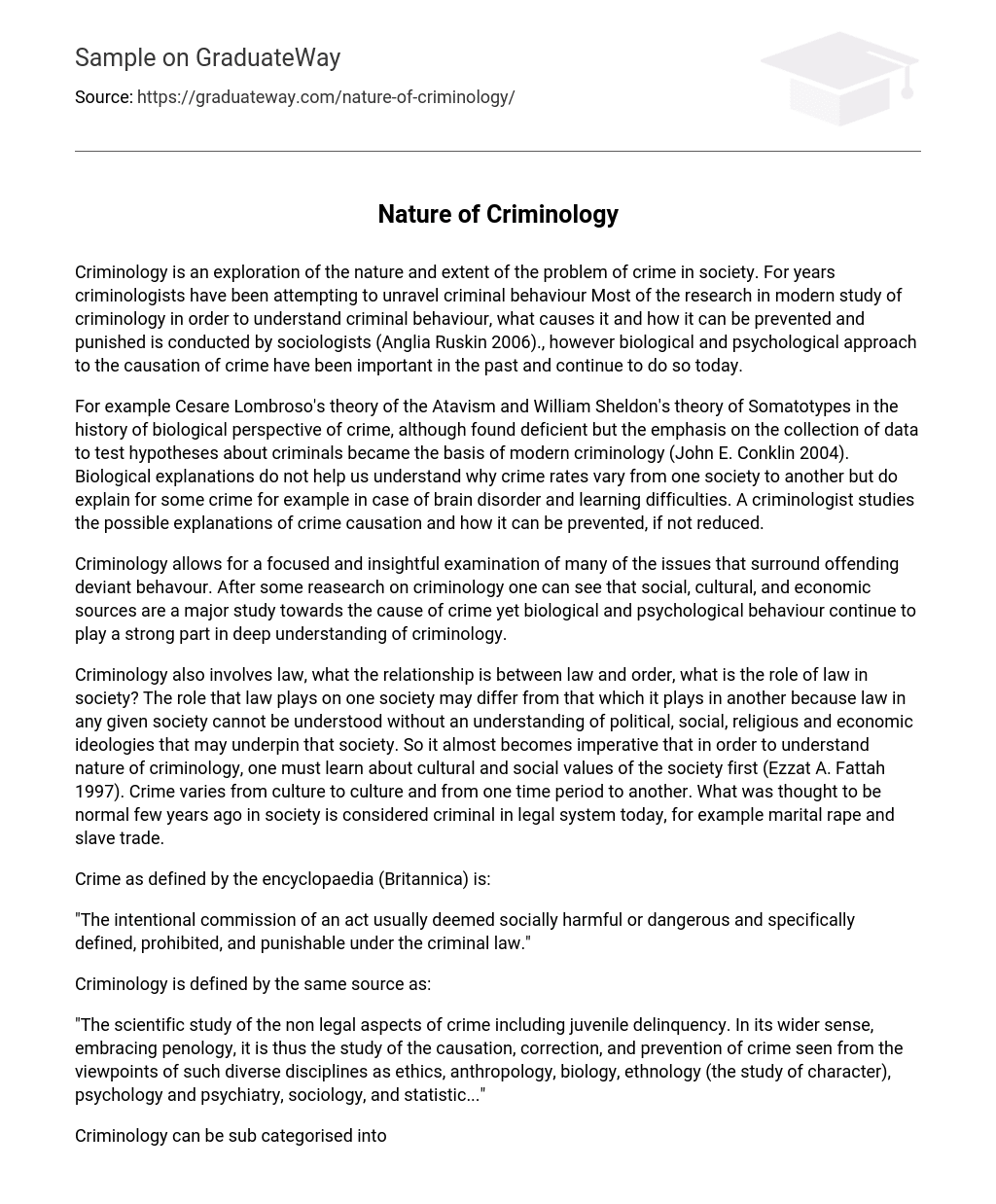Criminology is an exploration of the nature and extent of the problem of crime in society. For years criminologists have been attempting to unravel criminal behaviour Most of the research in modern study of criminology in order to understand criminal behaviour, what causes it and how it can be prevented and punished is conducted by sociologists (Anglia Ruskin 2006)., however biological and psychological approach to the causation of crime have been important in the past and continue to do so today.
For example Cesare Lombroso’s theory of the Atavism and William Sheldon’s theory of Somatotypes in the history of biological perspective of crime, although found deficient but the emphasis on the collection of data to test hypotheses about criminals became the basis of modern criminology (John E. Conklin 2004). Biological explanations do not help us understand why crime rates vary from one society to another but do explain for some crime for example in case of brain disorder and learning difficulties. A criminologist studies the possible explanations of crime causation and how it can be prevented, if not reduced.
Criminology allows for a focused and insightful examination of many of the issues that surround offending deviant behavour. After some reasearch on criminology one can see that social, cultural, and economic sources are a major study towards the cause of crime yet biological and psychological behaviour continue to play a strong part in deep understanding of criminology.
Criminology also involves law, what the relationship is between law and order, what is the role of law in society? The role that law plays on one society may differ from that which it plays in another because law in any given society cannot be understood without an understanding of political, social, religious and economic ideologies that may underpin that society. So it almost becomes imperative that in order to understand nature of criminology, one must learn about cultural and social values of the society first (Ezzat A. Fattah 1997). Crime varies from culture to culture and from one time period to another. What was thought to be normal few years ago in society is considered criminal in legal system today, for example marital rape and slave trade.
Crime as defined by the encyclopaedia (Britannica) is:
“The intentional commission of an act usually deemed socially harmful or dangerous and specifically defined, prohibited, and punishable under the criminal law.”
Criminology is defined by the same source as:
“The scientific study of the non legal aspects of crime including juvenile delinquency. In its wider sense, embracing penology, it is thus the study of the causation, correction, and prevention of crime seen from the viewpoints of such diverse disciplines as ethics, anthropology, biology, ethnology (the study of character), psychology and psychiatry, sociology, and statistic…”
Criminology can be sub categorised into three different disciplines to the causation of crime. The most common is the classical school which views crime as choice and freewill. The positive school is the opposite of classical school because positive school views criminal behaviour as mental disorder, biological effect or social and cultural factor. However the critical school looks into the description of crime, who defines what crime is and what is criminal (Harrower 1998) From crime prevention to community safety, from imprisonment to rehabilitation, criminology covers a whole range of issues that are discussed and argued on daily basis.
I am considered to be particularly reliable and dependable with excellent organisational skills. Can mix and converse at all levels and make the most of my appearance. A confident, cheerful and friendly person who enjoys meeting people from all walks of life. Have an excellent attendance and time keeping record. I can work equally effectively as a team member or using my own initiative. I strive for quality and apply process and discipline towards optimising my performance. Have a flexible approach to difficult situations and I also have responsible attitude towards working safely and efficiently. During my spare time I particularly enjoy reading books and increasing my knowledge about vastness of this world.
My growing interest and eagerness in causation of crime, my absolute and complete determination into the subject and most of all, my abilities and skills which will allow me to be successful in achieving this degree encouraged me into criminology. Criminology is a subject which opens a whole range of vacancies I can apply for allowing me with a better and firm grip at future prospects. My abilities as a team member and individual dependency and various other skills are the main tools I need to flourish and improve into more intellectual successor for future.
Bibliography
Books
John E Conklin 2004 Criminology. – John E. Conklin. – (8th edition) 2004
Ezzat A Fattah 1997 Criminology, Past Present and Future. – Ezzat A. Fattah 1997
Clear 1995, Tony Blair 1995 Prisons 2000. Roger Mathews and Peter Frances 1996
Roger Mathews 2000 Crime Disorder and Community Safety, – Roger Methews and John Pitts 2002
Harrower 1998 Julie, Applying Psychology to Crime, Hodder & Stoughton, 1998
Web
Anglia Ruskin University, what is criminology, http://www.anglia.ac.uk/ruskin/en/home/faculties/alss/deps/ss/courses/criminology/background_information.html
Britannica
http://www.britannica.com/eb/article-9109546/criminology





